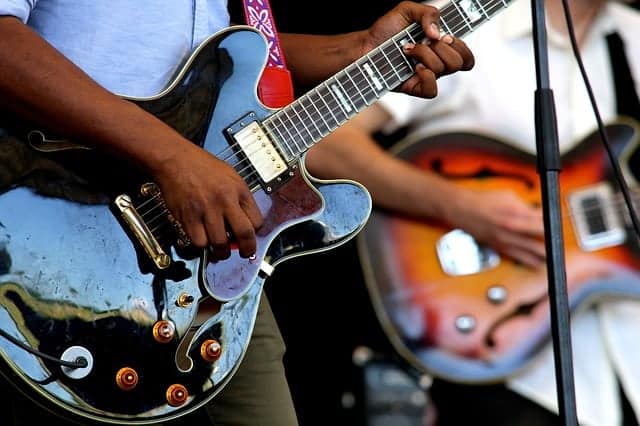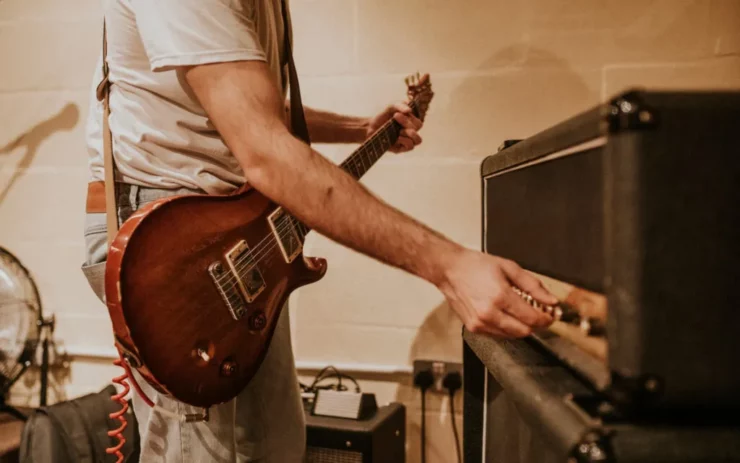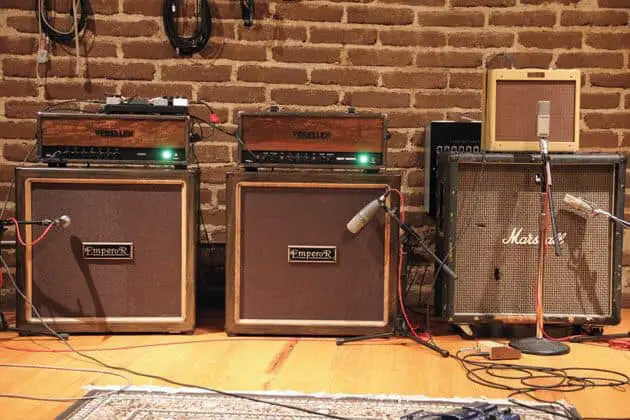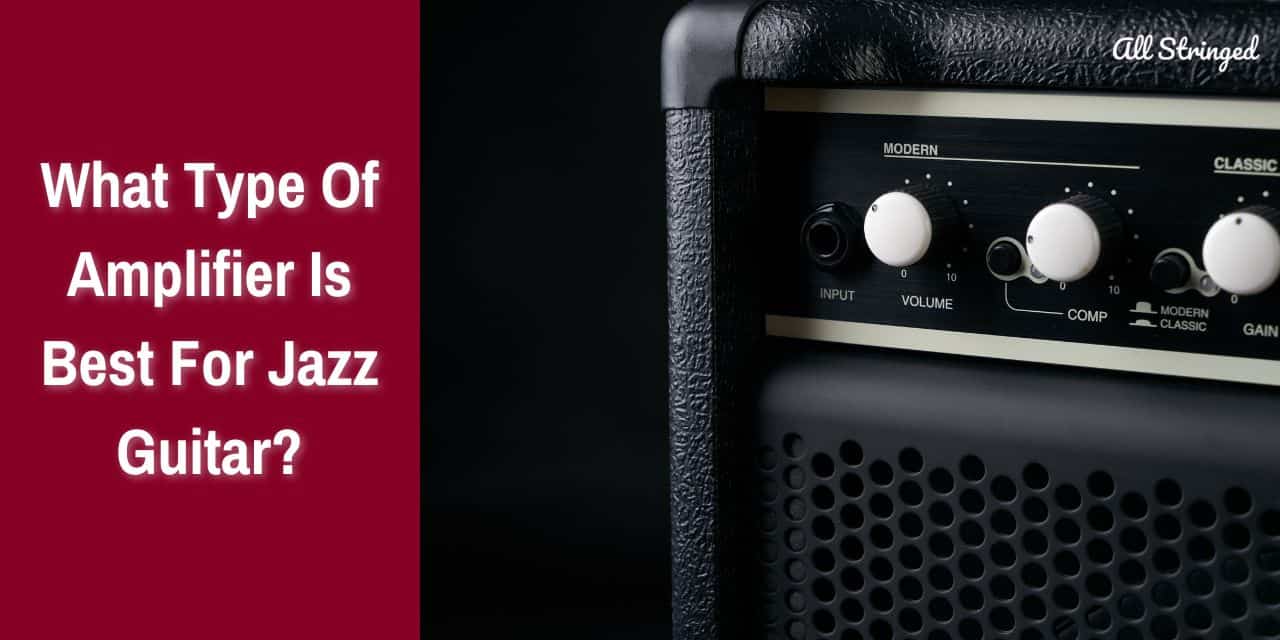Are you a jazz guitar player looking to make your sound bigger and better? Are you overwhelmed by the amount of choices out there and not sure which type of amplifier would be best for your music? Look no further! This article will help you learn more about the different types of amplifiers available and how they can be used to enhance your jazz playing. Keep reading to discover the best amplifier for you and your jazz guitar!
What does an amplifier do for jazz guitars?
Jazz, with its complex harmonies, smooth melodies, and provisional nature, is a music genre that demands a unique and versatile sound. While the jazz guitar itself is undoubtedly the heart of a jazz performance, the role of an amplifier shouldn’t be underestimated. These amps play a key role in shaping the tone, texture, and overall sound of jazz guitar, allowing musicians to achieve the warm, rich, and expressive tones that are synonymous with the music genre.
>>> Click here to read our review about the Top 15 Best Jazz Amps <<<
One of the main characteristics of jazz guitar is the pursuit of a clean and transparent sound. Jazz guitarists often prefer their notes to ring out with precision and clarity, allowing the subtleties of their playing to shine through. Guitar amps with clean, uncolored tones are essential in achieving this sonic objective. A good jazz amplifier should faithfully reproduce the natural timbre of the guitar without adding unwanted distortion or overtones.
Jazz guitarists seek a warm and rich tone that complements the mellow nature of the genre. Guitar amps that offer a smooth and full-bodied sound can enhance the expressive qualities of the instrument, adding depth and character to each note played. Vacuum tube amps are popular choices among jazz guitarists as they can produce a warm and organic sound that complements the intricacies of jazz phrasing and chord voicings.
In jazz music, the ability to articulate each note clearly and control dynamics is crucial. A responsive guitar amp allows the player to convey the nuances of their playing, from gentle fingerpicking to bold, staccato lines. Guitar amps with sensitive volume and tone controls allow jazz guitarists to achieve the desired expression in their playing, ensuring that every note is conveyed with finesse and emotion.
Reverb is an important element in jazz guitar playing as it adds a sense of space and ambiance to the sound. Many jazz guitarists prefer amps with built-in reverb, allowing them to create a natural, room-filling sound reminiscent of classic jazz club performances. The right amount of reverb can help achieve a lush and immersive sound that complements the intimacy of jazz guitar melodies.
While jazz guitar is often associated with a clean and warm sound, jazz musicians often explore various styles and genres with their performances. A versatile guitar amp can handle different tones and effects, allowing jazz guitarists to experiment with different sounds and expand their artistic palette. Some guitarists might also incorporate subtle effects like chorus or delay to add complexity to their playing and a flexible map can accommodate these artistic choices.
In jazz ensembles, guitarists often collaborate with other musicians, including pianists, horn players, and bassists. A well-balanced and responsive guitar amp allows the guitar to blend seamlessly with other instruments without overpowering the ensemble. The ability to control the amp’s volume and EQ settings helps the guitarists find their place in the musical conversation and create a harmonious balance within the group.

Different types of guitar amps for jazz guitars
When it comes to playing jazz guitar, achieving the perfect tone is a pursuit that demands careful consideration of the amp. There are different types of guitar amps, with each one of them bringing their own set of characteristics and qualities to the table. In the world of jazz, where subtlety, clarity, and warmth are paramount, choosing the right amp is important to crafting the perfect sound. Here are the different types of guitar amps for jazz guitars.
Tube amps
Tube amps or valve amps have been a staple in the world of jazz guitar for decades. These amps make use of vacuum tubes to amplify the guitar signal, producing a warm, rich, and organic sound that is generally sought after in the world of jazz music. The natural compression and harmonic saturation of tube amps lend themselves well to the expressive phrasing and nuanced dynamics of jazz guitar playing.
In jazz music, where clean and transparent tones are often desired, tube amps truly excel in delivering a smooth sound that maintains the integrity of the guitar’s tone. Jazz guitarists appreciate the touch-sensitive response of tube amps, allowing them to achieve expressive articulation and controlled dynamics in their playing. The use of reverb and the interaction between the tubes and the speaker contribute to the overall ambiance of the sound. This makes tube amps a popular choice in jazz clubs and performances.
Solid-state amps
Solid-state amps operate using solid-state electronics instead of vacuum tubes. These amps are known for their lightweight design, reliability, and affordability. While they might not provide the same level of warmth and harmonic complexity as tube amps, modern solid-state amps have certainly come a long way in emulating some of the desirable characteristics of their tube counterparts.
For jazz guitarists, solid-state amps offer clarity and accuracy in reproducing the guitar’s natural sound. They offer a clean and transparent tone that allows the guitarist’s playing to shine through without coloration or distortion. Moreover, solid-state amps can be an amazing choice for guitarists who prefer a more straightforward and consistent sound, without the need for frequent tube replacements or adjustments.
Digital modeling amps
Digital modeling amps are the more modern innovation in amplifier technology. These guitar amps use digital signal processing to simulate the sound of various classic amps, effects pedals, and speaker cabinets. They offer an impressive range of tones and settings, making them highly versatile for jazz guitarists who wish to experiment with different sounds and styles.
In jazz guitar playing, digital modeling amps can be a valuable tool for achieving specific vintage tones and effects. They offer access to a wide array of sounds, allowing the guitarist to recreate the ambiance of various jazz clubs or historical performances. Moreover, these amps often come equipped with built-in effects like chorus, reverb, and delay, which are essential elements in shaping the classic jazz guitar sound.
What type of amplifier is best for jazz guitar?
For jazz guitarists, finding the right amp is an important prerequisite that significantly influences their playing and overall sound. As a genre known for its intricate melodies, sophisticated harmonies, and expressive dynamics, jazz demands a unique set of qualities from a guitar amp. This is why you might wonder what type of amplifier is best for jazz guitar. The answer is easier than you think. Here are some of the characteristics that you’ll need to look for in a guitar amp to determine if they’re capable enough for jazz guitars.
Power rating
The power rating of a guitar amp refers to the wattage or output power it can produce. For jazz guitar playing, a moderate power rating is often preferred. While high-wattage amps might be suitable for rock or metal genres, jazz guitarists typically seek a balance between volume and tonal clarity. A good rule of thumb for jazz is to aim for an amp with a power rating in the range of 15 to 40 watts.
The moderate power allows the guitar amp to produce a clean and transparent sound even at higher volumes. This is important for conveying the subtle nuances of jazz playing. Moreover, a mid-range power rating will ensure that the amp can handle the dynamics of jazz guitar without excessive distortion while still delivering enough headroom for dynamic control during solos and ensemble playing.
Tone controls
Tone controls are vital for shaping the sound of a guitar amp to suit jazz guitar playing. A good jazz amp should have a comprehensive set of tone controls, typically including bass, middle, and treble adjustments. These controls allow the guitarist to shape the frequency response and tailor the tone to match the playing style and characteristics of their guitar.
For jazz, a flat and balanced EQ setting is typically preferred, with a slight emphasis on the mid-range frequencies to bring out the warmth and expressiveness of the instrument. The ability to adjust the tone controls precisely enables the jazz guitarist to achieve the desired clarity, warmth, and presence in their sound.

Connectivity
Connectivity options are important for the modern jazz guitarist who might need to connect to various devices and systems. A good jazz amp should ideally have a decent range of connectivity options, including a direct output or line out, a headphone jack, and auxiliary input. The direct output allows the guitarist to connect the guitar amp directly to a mixing console or audio interface, making it ideal for live performances and studio recording.
A headphone jack allows private practice and silent rehearsal whereas the auxiliary input allows for playing along with backing tracks or music from external devices. Having these connectivity options will ensure the jazz guitarist’s versatility and adaptability in various playing situations.
Effects
While jazz guitarists often prefer a more straightforward and unprocessed sound, certain effects can be tastefully incorporated to add depth and texture to their playing. Delay and reverb are effects that work particularly well in jazz guitar playing. Reverb offers a sense of space and ambiance, emulating the ambiance of a jazz club or concert hall. Delay can be used sparingly for adding a subtle and melodic echo to certain phrases, enhancing the expressiveness of the playing.
A good jazz amp should have built-in reverb, and ideally, an effects loop to integrate external effects pedals seamlessly. Having an effects loop allows the jazz guitarist to place time-based effects after the preamp stage, ensuring you get a clean and natural sound while preserving the amp’s tone.

How to test a guitar amp for playing jazz guitar?
When it comes to finding the perfect guitar amp for jazz guitar playing, it will be important to thoroughly test and evaluate your options. Jazz, with its emphasis on clean tones, nuanced dynamics, and expressive phrasing, demands a guitar amp that can faithfully reproduce the subtleties of the instrument. To make sure the guitar amp complements your playing style and creative vision, there are certain steps to follow to test the amp. Here are the steps you will need to follow to test a guitar amp for playing jazz guitar.
Listen to sound samples
Before you head to the music store to test a guitar amp or before you buy one online from platforms like Roland, it’ll be important to conduct preliminary research and listen to sound samples online. Many amp manufacturers and retailers offer sound demos and video reviews of their products on their official websites. Listening to these sound samples will give you a better sense of how the guitar amp performs and the tonal characteristics it offers. When listening to sound samples, you must pay attention to clean tones, warmth, dynamics, effects, and more.
You should focus on the guitar amp’s ability to produce clean and transparent tones. Jazz guitarists generally prioritize clarity and warmth in their sound, so look out for how well the amp handles clean settings. Moreover, you should also consider the amp’s capacity to produce a warm and rich tone as this quality is highly desirable in jazz guitar playing. A rich and expressive tone will enhance the intricacies of jazz phrasing and chord voicings.
Evaluate the guitar amp’s responsiveness to dynamics. Jazz guitarists rely heavily on expressive playing, so it is important to find an amp capable of handling subtle volume changes and articulate playing. Take note of the amp’s built-in reverb and effects options. Reverb, in particular, is a vital element in jazz guitar playing to add ambiance and depth to the sound.
Test the amp in person
While listening to sound samples online will give you the preliminary impression, there is simply no substitute for testing the amp in person. Visiting a music store or attending guitar gear expos gives you the opportunity to experience what the amp is all about firsthand and evaluate its performance under your playing style.
Testing the amp with your own guitar will be important as it allows you to hear how the guitar amp complements your specific instrument. Different guitars can interact with amps in unique ways and testing your guitar will ensure that you can get an accurate representation of your amp’s tone. Experiment with different playing styles, including chord progressions, single-note lines, and improvised solos. Playing different styles of jazz on the guitar amp will help you gauge its versatility and responsiveness.
Spend some time tweaking the amp’s tone controls to find the right balance for your preferred jazz sound. Adjust the bass, treble, and middle settings to tailor the sound to your liking. If the amp has built-in effects, experiment with them to assess their usability and how well they integrate into your jazz playing. Evaluate how the amp performs at different volume levels. Make sure that it maintains clarity and clean tones even at higher volumes, which is important for ensemble playing and live performances.
Budget considerations for guitar amplifiers
When it comes to purchasing a guitar amp for jazz playing, budget considerations play an important role in the decision-making process. Jazz guitarists are always looking for a delicate balance between tone, quality, and affordability. There are certain budget considerations that you must keep in mind if you’re looking to buy a guitar amp, especially if you are on a budget.
New vs. used amps
Purchasing a brand-new guitar amp has its advantages, especially for jazz guitarists who prioritize warranties, reliability, and the latest technology. New guitar amps come with a manufacturer’s warranty, providing peace of mind and protection against defects or malfunctions. Moreover, new amps are more likely to incorporate the latest features, design improvements, and technological advancements, ensuring that you have access to the most up-to-date capabilities.
Another perk of buying a new guitar amp is the opportunity to test it in person, listen to the sound quality, and assess its performance before making the purchase. You’ll be able to visit music stores or attend guitar gear expos to experience the amp firsthand. This will allow you to make an informed decision based on your playing style and tonal preferences.
However, you must remember that new guitar amps generally come with a higher price tag, which might be a significant consideration for budget-conscious jazz guitarists. Depending on the brand, model, and features, new amps can be more expensive than their used counterparts.
Meanwhile, opting for a used guitar amp can be a budget-friendly alternative as it will allow you to access higher-quality amps at a more affordable price. Many used guitar amps have already undergone the break-in period, which means they have been played and conditioned a lot. This potentially results in a smoother and more refined tone compared to a brand-new amp. Vintage or discontinued models might also be available in the used market, offering unique tonal characteristics and sought-after features.
One of the biggest drawbacks of buying used guitar amps is the absence of a manufacturer’s warranty. However, some music stores and online marketplaces do offer warranties or return policies for used gear, mitigating this concern to some extent. When buying a used amp, it is important to inspect the condition, test it in person, and enquire about any previous repairs and modifications.
Cost of accessories
In addition to the guitar amp itself, jazz guitarists should also consider the cost of essential accessories to enhance their playing experience. These accessories may include speaker cabinets, cables, effects pedals, and power conditions.
Some guitar amps are available as a head unit, requiring a separate speaker cabinet to produce sound. If buying a head and cabinet separately, the cost of the cabinet must be factored into the overall budget.
High-quality instrument cables are important for preserving the guitar amp’s tone and ensuring reliable signal transmission. Investing in durable and shielded cables is important for jazz guitarists looking for clean and clear tones.
While jazz guitarists typically prefer a straightforward sound, certain effects like delay and reverb can add depth and ambiance to the playing. Paying extra for any desired effects pedals will enhance your sonic palette.
A power conditioner will protect your guitar amp and other gear from electrical surges and noise. This way, you can be assured you will get consistent and clean power delivery.
FAQs
What type of amplifier is best for jazz guitar?
The best type of amplifier for jazz guitar depends on the sound and volume level you are looking for. Generally, tube amplifiers are considered to be the best choice for a classic jazz sound. However, solid state amps and hybrid amps can also produce a great jazz tone, albeit with a slightly different character.
What should I keep in mind when choosing an amplifier for jazz guitar?
When choosing an amplifier for jazz guitar, it’s important to consider the power, speaker size, features, and tone control. For jazz, it’s important to have a good range of tonal options as well as plenty of power to get the sound you want. It’s also a good idea to look for an amplifier with a good range of EQ settings and effects.
What are the benefits of using a tube amplifier for jazz guitar?
Tube amplifiers are known for their warm and dynamic tone, which is ideal for jazz guitar. They also provide plenty of volume, allowing you to get a great sound even at low volumes. Tube amplifiers also offer plenty of tone shaping options and can make your guitar sound smooth and warm.




